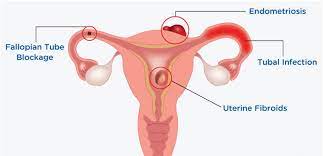Delaying Motherhood: Is Africa’s Fertility Ticking Clock?

Across Africa, cultural norms have traditionally encouraged women to marry and have children at a young age. However, changing times, urbanization, education, and career aspirations are reshaping this narrative. An increasing number of educated and career-focused women are choosing to delay marriage and childbearing, prioritizing financial independence and professional growth.
While this shift represents empowerment and progress, it also comes with fertility challenges. The natural decline in female fertility with age, rising cases of secondary infertility, and limited awareness about reproductive health leave many women vulnerable to difficulties in conceiving later in life.
Changing Trends: Education, Careers, and Later Motherhood
In many African cities, young women are staying longer in school, pursuing higher education, and entering competitive career fields. For these women, childbearing is often postponed until their late 30s or 40s, when they feel more financially secure and emotionally prepared for parenthood.
-
Urbanization and career focus: Professional women in finance, law, medicine, business, and technology are delaying childbirth to focus on career advancement.
-
Economic considerations: Many women prefer to wait until they can provide a stable home and quality education for their children.
-
Changing social norms: In urban areas, there is growing acceptance of delayed marriage and childbearing compared to rural communities.
This trend mirrors global patterns, but in Africa, where fertility is strongly tied to identity and social value, delayed childbearing creates unique challenges.
The Biology of Fertility and Age
One of the biggest challenges with delayed childbearing is the natural age-related decline in fertility. Unlike men, who can produce sperm throughout their lives, women are born with a fixed number of eggs. Both the quantity and quality of these eggs decrease with age.
-
Fertility peaks in the early 20s to late 20s.
-
By age 35, fertility begins to decline significantly.
-
After age 40, the chances of natural conception drop sharply, and risks of miscarriage or chromosomal abnormalities increase.
Despite these biological facts, many women in Africa are unaware of the link between age and fertility. Some assume that medical technology like IVF can fully overcome age-related infertility, but even assisted reproductive technologies have lower success rates after 40.
Rising Cases of Secondary Infertility
Another growing concern in Africa is secondary infertility—when a woman who has previously given birth struggles to conceive again. This condition is increasingly common among women who delay having additional children.
For example, a woman may have her first child in her early 20s but wait until her late 30s or early 40s for a second child. By then, her fertility may have declined, or she may have developed conditions such as fibroids, endometriosis, or blocked fallopian tubes.
Secondary infertility often comes as a shock, as many women assume that because they conceived easily once, they will not face challenges later. This underscores the urgent need for fertility education across Africa.
Limited Awareness About Fertility Decline
One of the biggest challenges in Africa is the lack of awareness about reproductive timelines. Fertility education is rarely taught in schools, and conversations about reproductive health are often limited to menstruation, pregnancy prevention, or sexually transmitted infections.
As a result:
-
Many women assume they can conceive at any age, especially with modern medicine.
-
Couples may delay seeking help, reducing their chances of success with fertility treatments.
-
Communities continue to stigmatize childlessness without understanding the biological realities.
In some cases, cultural myths further complicate the issue, with infertility attributed to spiritual causes instead of biological factors.
Addressing the Challenge: A Path Forward
To support women in balancing education, careers, and motherhood, Africa must address the gap between modern lifestyles and reproductive realities.

-
Fertility Education
-
Schools, health programs, and community campaigns should teach about the impact of age on fertility.
-
Women and men should learn about their biological timelines early.
-
-
Improved Access to Fertility Care
-
Expanding IVF and ART centers across Africa can help couples who delay childbearing.
-
Subsidies and insurance coverage are needed to make treatments affordable.
-
-
Encouraging Timely Family Planning
-
Couples should be encouraged to plan for children while considering both career and biology.
-
Options like egg freezing, though expensive, may offer solutions for some.
-
-
Breaking Cultural Myths
-
Communities must shift from blaming women for infertility to understanding shared responsibility and biological limits.
-
Conclusion
The trend of delayed childbearing among educated and career-focused African women is a sign of progress, empowerment, and changing societal roles. However, it also highlights the urgent need for fertility awareness, medical access, and cultural openness.
Without proper education and healthcare, many women risk facing the heartbreak of infertility—often misunderstood by society. By raising awareness about the impact of maternal age on fertility, Africa can empower women to make informed choices that balance personal dreams with biological realities.
Written by Fawzi Rufai, Medically Reviewed by Sesan Kareem



